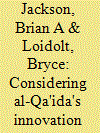| Srl | Item |
| 1 |
ID:
120331


|
|
|
|
|
| Publication |
2013.
|
| Summary/Abstract |
Understanding how terrorist groups innovate and adapt is key for anticipating future shifts in terrorist threats. Past innovation studies have identified factors that shape group behavior, as well as the importance of combining study of organizations' innovation doctrines with data on how these doctrines are put into practice. Here we describe such an analysis for two texts that have shaped al-Qa'ida and its associated movements' strategies: contrasting Naji's Management of Savagery with al-Suri's Call to Global Islamic Resistance-including elements of the latter relevant to innovation specifically translated for this work. Though open source data on the groups' innovation practices are necessarily more sparse, we contrast the doctrinal texts with selected examples, which suggest caution in assuming that group doctrine is necessarily put into practice "as written."
[Supplemental materials are available for this article. Please visit the publisher's online edition of Terrorism and Political Violence for the following free, supplemental resource: Translation of portions of Abu Mus'ab al-Suri's The Call for Global Islamic Resistance, relating to innovation and learning.]
|
|
|
|
|
|
|
|
|
|
|
|
|
|
|
|
| 2 |
ID:
137974


|
|
|
|
|
| Summary/Abstract |
Dennis Blair was itching for a fight. In May 2009, the retired U.S. Navy admiral was serving as the director of national intelligence (DNI). Theoretically, Blair’s title gave him oversight of the CIA and Washington’s constellation of 16 other spy agencies. Yet, in reality, the director was powerless even to designate the senior American spy in a given country—a rank that, for decades, had traditionally been given to the CIA station chief in capitals from London to Beirut. Blair felt entitled to have charge over this. So sidestepping the White House, he sent a written order codifying that the DNI would now be the one to select the most senior spies. But there was one more important change: That person could be associated with any agency within the intelligence community. Though Blair said that the designee would almost always continue to be selected from the CIA, this didn’t sit well with the agency’s then director, Leon Panetta. He responded by shooting off a cable to all of the CIA’s overseas stations effectively telling them to ignore Blair’s memo completely.
|
|
|
|
|
|
|
|
|
|
|
|
|
|
|
|